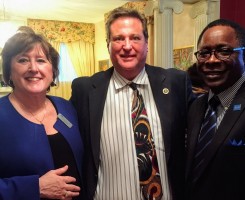As I stated in an earlier column, Donald Trump is right and foreign policy elites, hidebound in old assumptions, are wrong. The good old days, which the beltway insiders lament, weren’t really that good.
I can’t stress this principle enough: Today’s political conflict isn’t Republican vs. Democrat or even left versus right, it’s the political elites vs. the ordinary people.
You can certainly observe the elites versus people conflict in the struggle by the never-Trump national media and Washington swamp insiders, most currently in the James Comey and Russian collusion entanglements. I want to again address this conflict with regard to foreign policy though.
Not being willing any longer to be manipulated is not succumbing to isolationism. Wondering whether the United States can afford another liability is not mindless nationalism. Questioning whether America can afford the status quo here and abroad is not heresy. Assuming we can borrow our way out of any inconvenience is largely over.
Donald Trump inherited an array of perennial crises when he was sworn in as president in 2017. He certainly did not possess the traditional diplomatic skills and temperament to deal with any of them.
What helped elect Trump was a collective weariness with demands put on a country $20 trillion in debt. America is currently running a $57 billion a month trade deficit.
The poverty of inner-city Detroit, or rural Central California, or West Virginia does not suggest an endlessly opulent nation, at least as a visitor might conclude from visiting Manhattan, Chevy Chase, or Presidio Heights. The fact that the most recession-proof area of the entire country is the Washington DC suburbs is a disgrace that insulates the nation’s policy-makers from its citizens.
The foreign policy is simply “America first.”
Donald Trump’s foreign policy has no time or patience with protocols and is unhindered by ideology such as democracy-building.
Let’s review some of the most pressing issues.
Trump dared to challenge the assumptions behind the NATO alliance. He dared to suggest that NATO is obsolete and the Europeans should stop riding the cart and get out and pull.
Mexico has been allowed to use the U.S. as a safety valve, preventing any internal reform to help its own citizens. This drain on the U.S. economy must stop now.
China has been allowed to ignore international rules in various aspects of its trade policies. It skirts copyright and patent laws. It expropriates U.S. technology. It hacks and runs extensive commercial espionage enterprises.
The Palestinians play a strange game with U.S. policymakers. They are the most dependent people on government aid on Earth. They accept that over 60 percent of the U.S. population is unsympathetic to their agendas. But they also assume that Americans should variously route them about $700 million in annual aid—apparently on the premise that without such American help there is no telling what they might do to Israel or U.S. interests.
Finally, the common denominator of these absurdities is again that the United States is $20 trillion in debt—a fact that Trump will soon have to address. We shall soon if what was deemed untouchable will turn out to be rather easily unfunded—whether it is a new defense program, a Medicare prescription drug benefit, or social services for illegal aliens. Also, it is not set in stone that half the country shall always pay no income tax.
Donald Trump’s presidency is many things, but there is one common denominator with all that has transpired since November 2016. The once unimaginable can become normal. When the veneer of conventional wisdom and practice is torn off, Americans learn that was not much there underneath after all, whether that idea is that we can never question open borders or Chinese commercial cheating—or whether it is complacency in our penchant to keep borrowing without worries over tomorrow.
John Bolton was a terrific choice for National Security Advisor. It seems obvious why Trump and Bolton have clicked so well. Neither has much time for deference or protocol, both revel in speed of action, and both prioritize the pursuit of near-term
President Trump is a doer, a problem-solver, not a diplomat who is both educated in and constricted by traditions and protocols. We are quickly heading into a different time, one in which the long-accepted status quo will have to be let go. What’s needed now is a different kind of diplomacy. It’s not about tradition or protocols, it’s about what works.













